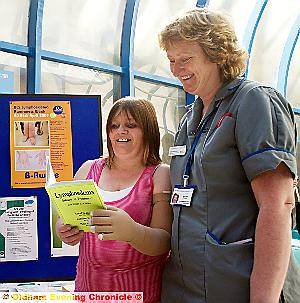Helen’s Readdie to help patients
Reporter: Beatriz Ayala
Date published: 20 May 2009

Julie Bowers (left) and Helen Readdie
A nurse at the Royal Oldham Hospital is raising awareness of a painful condition which affects more than 100,000 people in Britain.
Helen Readdie’s target is primary lymphoedema, an incurable condition which causes painful swelling.
The condition is normally associated with cancer patients who have undergone treatment and developed secondary lymphoedema.
However, little is known about primary lymphoedema, which may be present at birth, develop at puberty or in mid-life, and is responsible for every three in four cases of lymphoedema.
Mrs Readdie, a lymphoedema nurse specialist, is highlighting the fact that people do not necessarily have to have had cancer if they are suffering from lymphoedema
She said: “A person may not have a properly working lymphatic system, which leads to swelling that will last for ever.
“This condition can cause psychological problems because people feel body conscious and it generates a lot of anxiety.
“It can also affect their employment and relationships.
Julie Bowers (45), of Arbour Road, Holts, had never heard of lymphoedema before being diagnosed but has now learned to live with the condition.
When her arm started to swell, she thought she had an infection.
She said: “At first I thought I’d had an allergic reaction to something or that I had got cellulitis.
“I had intravenous antibiotics but the swelling wouldn’t go down.
“Then I noticed I had swelling here, there and everywhere and before I knew it my arm started getting stiff and became painful.
“I was sent to see a consultant and he confirmed I had lymphoedema.
“I’ve gone from being a very independent person to relying on my daughter, my sons and the rest of my family.
“I find that tough but I’m very grateful that they are there.
“Not a lot of people know about this because GPs think it is secondary lymphoedema and therefore related to cancer treatment.”
Mrs Readdie added: “People who suffer from the condition need rehabilitation and my role is to help educate people about it.
“The earlier we can detect lymphoedema the better the treatment.”
For more information visit www.lymphoedema.org.
Most Viewed News Stories
- 1Oldham man part of crime gang caged for more than 30 years
- 2Family pay emotional tribute to grandfather Mark after Chadderton driver is jailed for seven years
- 3Beer walk proves a huge hit yet again
- 4The hills are truly alive with amazing music
- 5FCHO granted injunction following reports of anti-social and criminal activity in Chadderton




